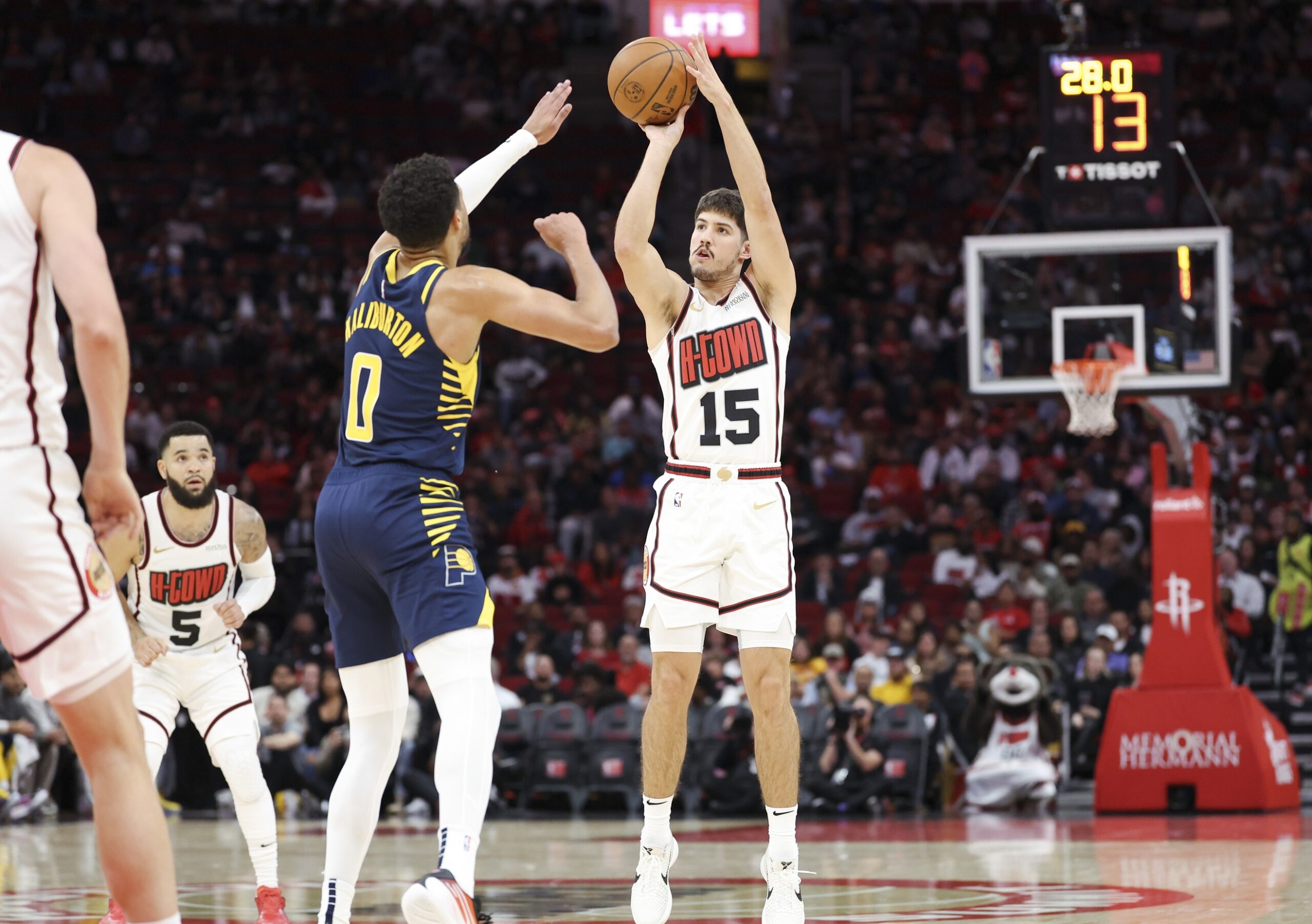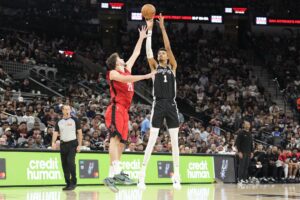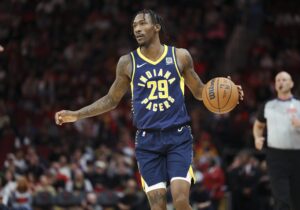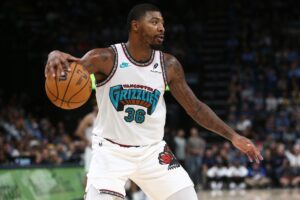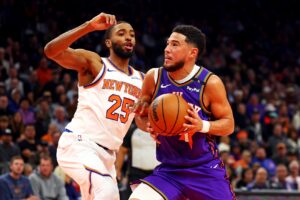The Houston Rockets fell back into old habits in their recent loss to the Portland Trailblazers. While a trap game, as the second of a back-to-back against the same opponent, the offensive woes did invite a certain question. What could Houston do to ward off its shooting woes?
This Rookie Could Send Houston’s Shooting Shooting Up
The recent adjustment of running more dribble handoff action with Houston’s star big man Alperen Sengun did meet with early success. Additionally, head coach Ime Udoka has swapped some of Sengun’s low-post touches for face-ups from the elbow. This was especially key against Portland’s rookie big, Donovan Clingan.
Clingan looked like Richard Kiel’s Jaws next to Roger Moore’s James Bond when matched up with Sengun. In the end, Sengun left the rookie neither shaken nor stirred, as Clingan held up fairly well even against Sengun’s face-up attack (and he took home 19 rebounds for his effort). The Rockets’ main issue was shooting 25% from three.
The handoffs disappearing in the Blazers game could have been because of the low overall intensity, a matchup priority of Sengun attacking Clingan in isolation, or just a product of Houston’s poor shooting. But there’s one player in particular who fans would relish seeing involved in these types of handoff actions. That is Houston’s own rookie and third overall selection, Reed Sheppard, who doesn’t currently have even the 10 possessions to qualify.
Reed Sheppard’s Role On The Rocket Ship
Veteran point guard leader, Fred VanVleet was able to avoid a suspension for his recent refereeing analysis. That’s good for the Rockets, particularly with an important NBA Cup game up next against the Minnesota Timberwolves (another reason the Portland game could be described as a trap). It’s not such good news for Sheppard’s playing time.
Those predicting a limited role for Sheppard this season have thus far proven correct. While it’s true that some rookies do come in ready to contribute immediately on good teams, it tends to be lower-ceiling, multi-year college players. Even then, some roles are easier to pick up than others. For point guards and centers, essentially charged with running the offense and the defense respectively, it’s a lot trickier. Even a generational talent such as Luka Doncic, who was ready to contribute from the two-inch jump, didn’t take over Dallas’ offense until year two.
It’s conceivable that Sheppard might be the kind of player who could figure out how to contribute quite quickly. What he can’t do is figure out how to run the offense in 12.4 minutes per game. And that’s not to say that Udoka should invest more minutes into that goal either.
While the Rockets do need additional ball-handling, they need shooting even more. As of writing, the Rockets have the third-worst three-point shooting percentage in the NBA. Sheppard hasn’t needed long at all to start figuring that bit out.
How Sheppard Can Steer Houston’s Shooting Upwards
Sheppard is averaging 6.3 three-point attempts per 36 minutes. Among Houston’s regular contributors, that’s third behind only Jalen Green and VanVleet. Those two average 9.6 and 7.4 respectively. Unfortunately, on the season so far, their averages are 30.7% and 30.5%. Sheppard had a slow start but is already up to 38.5%.
Houston didn’t get scammed again with college shooting the way they were with Jabari Smith Jr. Sheppard is a legitimately good shooter (Smith is also getting back towards last year’s numbers). Of course, the appeal of a legitimately good shooter at 6’2 is somewhat diminished compared with at 6’10, but the Rockets need all the legitimately good shooting they can get.
Sheppard’s role on offense should become all about letting it fly. There’s no need for him to play the drive-and-kick game. If he’s the one driving, there’s no one for him to kick out to anyway. His role on the perimeter should be relocation, relocation, relocation. Coming off of handoffs and generally going all out to find the premium real estate for open catch-and-shoot threes. There’s plenty of it out there on this team, just waiting to be discovered.
The old-school-looking dribble that miraculously worked for him in Summer League is doing him no favors at the NBA level. His reads are often correct, but more often too slow. The ball-handling and decision-making parts of his game can be reintegrated once he’s instilled the appropriate amount of terror in his opponents over his shot.
So What’s Udoka Thinking?
Udoka has an offensive asset on his hands but he’s playing him in such a way as to turn him into a liability. Sheppard’s either out there in lineups that go through VanVleet or he’s running pick-and-rolls with Jock Landale. Sheppard and Sengun have averaged 3.8 minutes per game together. Of course, considering Udoka’s priorities, it’s probably that he sees the potential sniper as a defensive liability that keeps said sniper on the bench.
Sheppard has struggled on that end of the floor. It’s not just his size either, though in a team full of long, athletic wings he is always going to be targeted. His worst problem is that he gets stuck ball-watching and frequently loses his man in off-ball situations as well. Frequently for how much he plays that is. For a team without a premier rim protector, that’s a major minute-cruncher. He’s still found time to dig some diamonds from the rough though.
The Last Word
Sheppard has a long way to go in his career and he’s certainly not ready to step up and answer all of Houston’s problems right now. It’s also true that Houston doesn’t even have that many problems. In a loaded Western Conference, they’ve spent more time flirting with a top seed than a mere play-in spot. But a tough run of games is coming up. Houston’s lack of shooting has hurt them already and will hurt them again. Sheppard could be the ointment to what ails them, but Udoka would have to unscrew the bottle.


